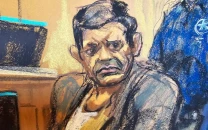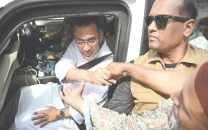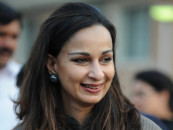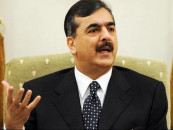Four IHC judges stand their ground
Raise serious questions about the very legitimacy of the FCC

Despite facing mounting pressure from within their own institution, a group of Islamabad High Court (IHC) judges continues to adopt an assertive and uncompromising strategy in their struggle for judicial independence.
With the passage of the 27th Constitutional Amendment, the threat of their transfer to other high courts looms large. Yet four IHC judges — Justice Mohsin Akhtar Kayani, Justice Ejaz Ishaq Khan, Justice Saman Rafat Imtiaz, and Justice Babar Sattar — remain undeterred.
In September, the five IHC judges themselves came the Supreme Court to challenge several administrative orders of CJ Dogar. They also came in courtroom to express solidarity with Justice Jahangiri during the hearing of petition against his suspension.
On Thursday, they challenged the 27th Amendment before the Supreme Court, which subsequently declined to entertain their petition.
Following this, the judges submitted an application before the Federal Constitutional Court (FCC), requesting that their intra-court appeal (ICA) in the judges' transfer case be returned to and heard by the Supreme Court.
A larger bench of the FCC, led by Chief Justice Amin-ud-Din Khan, is scheduled to hear their ICA next week. The appeal is aimed at overturning the Supreme Court judgment that endorsed the transfer of three IHC judges.
In their application, the IHC judges have raised serious and fundamental questions about the very legitimacy of the FCC.
The legal community remains divided over the judges' current strategy. One section of lawyers fears that their petition against the 27th Amendment may push the executive to accelerate its plans against them.
After the amendment, it has become considerably easier for the government to remove them from office or transfer them to any other high court.
These lawyers argue that the IHC judges must understand that they currently enjoy no support from the present judicial leadership.
Likewise, some believe that by filing an application before the FCC, the judges may be perceived as accepting the forum's jurisdiction.
However, Barrister Salahuddin Ahmed — who represented them before the Supreme Court — rejected this interpretation.
"The application clearly states that they do not accept the FCC's jurisdiction or the transfer of the case from the Supreme Court to this court," he said. "It is similar to filing an application for the return of a plaint before a court that lacks jurisdiction."
Since May 2023, the IHC judges have consistently raised their voices against alleged executive interference in judicial proceedings. They first informed their then-chief justice about harassment and pressure directed at them and their families.
On May 2, 2023, the judges also met the then chief justice of Pakistan Qazi Faez Isa. Later, in March, they wrote a letter to the Supreme Judicial Council (SJC) seeking guidance on interference by state agencies in judicial functions.
However, their institution did not support their stance. Complaints of misconduct were filed against them, and social media campaigns targeting them soon followed.
When Justice Yahya Afridi became the chief justice of Pakistan, many expected that the pressure and harassment they faced would come to an end, but this did not materialise.
Subsequently, in what was widely viewed as an attempt to reassert control over the high court, the government transferred three IHC judges. One of them, Justice Sardar Muhammad Sarfraz Dogar, later became IHC chief justice.
It is also a fact that a section within the judiciary supported the government's plan against the IHC judges, and the transfers were ultimately endorsed by the court.
Justice Tariq Mehmood Jahangiri is currently facing allegations of holding a fake degree. He personally appeared before the Sindh High Court in the matter.
Meanwhile, an IHC bench led by CJ Dogar, while hearing a quo warranto petition, barred him from performing judicial work. The case is again fixed for hearing next week.
Recently, the SJC issued a notice to IHC judge Ejaz Ishaq Khan over a complaint of misconduct. The FCC, too, is scheduled to hear the judges' ICA next week.
It is also worth noting that Justice Arbab Tahir has distanced himself from the group and is not a party to their litigation. Justice Jahangiri likewise did not challenge the 27th Amendment before the Supreme Court.
Advocate Abdul Moiz Jaferii stated that the IHC judges were the first to expose the "hybrid charade" for what it was little more than a reckless scramble for power at any cost.
"Their struggle for independence has exposed their own chief justice, his successor, and their abettors among both Supreme Court judges and the executive," he said.
"Justice Isa had an answer to every question except when asked why he let these IHC judges down. The best he could say was that it all happened before his time."
Jaferii added that the former chief justice attempted to mask the situation by seeking reports from other high courts which, through polite language and veiled references, narrated their own experiences of interference and overreach.
"In petitioning against the 27th Amendment, the IHC judges have exposed yet another chief justice and yet another group supporting institutional overreach," he said. "Their fight is not just for their own independence, but for the independence of the judiciary as a whole."
Jaferii recalled the words of a former chief justice who once said, "Pity the nation," only to later turn the sentiment into a poem serving his own agenda.
"One can only pity the nation where a judge says his parents were abducted and the chief justice responds, 'Don't worry, I've talked to themthey won't do it again.'"
He said where another judge finds recording devices in his bedroom, and instead of investigating the intrusion, the state decides his decades-old degree is fake and abducts a professor on his way to lodge a protest at the university.
"Meanwhile, the judicial hierarchy sits in silence," Jaferii said.





















COMMENTS
Comments are moderated and generally will be posted if they are on-topic and not abusive.
For more information, please see our Comments FAQ